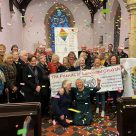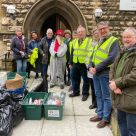 Drivers using a pioneering app to gather information on modern slavery in hand car washes made more than 900 reports of potential cases over a five-month period, according to research published today.
Drivers using a pioneering app to gather information on modern slavery in hand car washes made more than 900 reports of potential cases over a five-month period, according to research published today.
The Safe Car Wash app, which allows drivers to respond to a check list of key factors that may suggest modern slavery or labour exploitation in hand car washes, has been downloaded 8,225 times since its launch by the Church of England and the Catholic Church in England and Wales last year.
Between June and December 2018 there were 2271 completed entries using the app, with 41 per cent, or 930 reports, where after responding to a number of questions, users were told there was a likelihood of modern slavery at the hand car wash. They were then asked to call the Modern Slavery Helpline and their anonymised findings were shared in real time with police and the Gangmasters’ and Labour Abuse Authority.
Analysis by the University of Nottingham’s Rights Lab in a new policy report released today showed that nearly half of reports, or 48 per cent, commented that workers did not have access to suitable protective clothing such as gloves or boots, despite many hand car washes typically requiring their workers to use potentially harmful chemicals such as hydrochloric acid.
A large majority of responses, 80 per cent, said that the car wash had a cash only policy. Nearly one in 10, or 8 per cent, of reports logged that children were working on site, and 17 per cent of users identified fearful looking workers.
The app asked drivers to look out for nearby caravans, containers, mattresses and bedding as evidence of workers living on site. A total of 14 per cent of reports suggested that workers were living on the car wash site.
The app was launched last year by The Clewer Initiative, the Church of England’s campaign against modern slavery, and the Santa Marta Group, the Catholic Church’s anti-slavery project, with support from anti-slavery campaigners and other key agencies, including the police and councils.
Bishop Alastair Redfern, Chair of The Clewer Initiative, said: “This research from the University of Nottingham’s Rights Lab shows that the Safe Car Wash app has made an excellent start towards mapping the extent of modern slavery and labour exploitation in hand car washes, and, crucially raising public awareness of this issue.
“Sadly, the findings so far confirm what we already feared – that many car washes do not protect their workers.
“Our conversations with colleagues from law enforcement suggest that the data from the Safe Car Wash app is providing another piece in the puzzle of how to combat this complex crime. We hope to continue to build on this progress.”
Bishop Patrick Lynch, from the Santa Marta Group, said: “I welcome this report into the results of the Safe Car Wash app. I hope the app and this report will help many people become much more aware of the exploitation that workers in the car washing sector often have to endure.”
Dr Akilah Jardine, Research Associate at the Rights Lab, said: “Investigations and operations on hand car wash activities have identified the sector as a high-risk area for labour exploitation. Though often operating in plain sight, a great challenge in tackling abuses is the lack of data on the size and scope of the industry and the nature and prevalence of labour exploitation.
“The Safe Car Wash app shows the potential value of using technology in raising public awareness and leveraging the real life experience and insight of the community to improve our understanding of the sector and also gather the intelligence required to lead effective investigations.”
Notes to editor
● The app enables users to anonymously provide information on the location and setting of the car wash, workers’ access to suitable clothing, living arrangements, the presence of minors working on the site, and the cost and method of payment. Users are prompted to call the Modern Slavery Helpline on 08000 121 700 if their answers indicate that there is a likelihood of modern slavery or exploitation at the car wash. App users are advised not to confront anyone at the hand car wash and to make sure they are in a safe place before making the call. Anonymous data collected from the app is shared with the National Crime Agency (NCA), the Gangmasters’ and Labour Abuse Authority (GLAA) and the National Police Chiefs’ Council (NPCC).
● The findings show 126 calls to the Modern Slavery Helpline were made through the app. Information was not available as to whether other calls were made to the helpline as a result of a person using the app, without using the app’s call function.
● The results of the report and feedback from law enforcement has led to an update of the app being released alongside the report. The new version includes a demo mode for users who want to try the app before going to a hand car wash, and the ability to change the address of the hand car wash.
● A decade ago there were few hand car washes in the UK, but estimates now suggest that there are more than 18,000 on Britain’s high streets, at the sides of motorways, and on abandoned garage forecourts.
● Many are run as legitimate businesses, but some exploit, force and threaten their workers, trapping them in modern slavery. No reliable data existed previously as to the scale of the problem.
● The Clewer Initiative was launched in October 2017 with the backing of the Prime Minister Theresa May and the Archbishop of Canterbury. The programme is working to help the Church of England’s 42 dioceses support victims of modern slavery and identify the signs of exploitation in their local communities.
● The Santa Marta Group has members in over 30 countries and brings together the heads of national and international police and law enforcement agencies along with international organisations to look at how they can work with the Church to help victims. https://santamartagroup.com/
The indicators are:
Do the workers have access to suitable protective clothing? Look out for gloves and boots.
Is there evidence of workers living on site? Can you see a caravan or mattresses and bedding?
Does anyone appear controlling or intimidating?
Does the body language of the workers appear withdrawn or fearful?
Do there appear to be minors working at the car wash?
Did you pay less than £6.70 for the car wash?
Does the car wash only accept cash?
Did they offer a receipt?
Did you have to pay the manager?

















